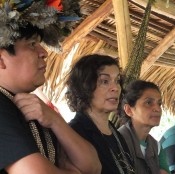Indigenous Tribe Wins Validation
for Landmark Forest Carbon Project
The Surui Carbon Project has earned dual validation from both the Verified Carbon Standard and the Climate, Community, and Biodiversity Alliance, which means both organizations have approved the project design. The next step is an audit by a third-party verifier who will check to make sure the project design is being followed and the emission-reductions are taking place. If they pass that test, they will become the first indigenous group to issue REDD credits.

12 April 2012 | A small tribe of indigenous people unknown to the outside world a half-century ago and once on the brink of extinction has harnessed an innovative forest carbon project to shield their territory from illegal logging and preserve their chosen way of life. As a result, the 1300-strong Paiter-Surui last week became the first indigenous tribe in the Amazon and globally to earn validationunder internationally recognized standards for keeping carbon locked in trees – setting the stage for scores of similar projects that can unleash needed funding for indigenous people who preserve endangered tropical rainforest across the Amazon.
“This project is good for the state of Rondí´nia and can serve as a model for other indigenous groups across the state and perhaps across Brazil,” said Nanci Maria Rodrigues, Environment Secretary for the Brazilian state of Rondí´nia, where the project is located.
“We’re watching it very closely in our state,” added Divaldo Rezende, Environment Secretary for the Amazonian state of Tocantins. “I know others are as well.”
The Surui Forest Carbon Project (SFCP) earned dual validation under both the Verified Carbon Standard (VCS), which ensures that the project is following recognized procedures for measuring carbon-emission reductions, and the Climate, Community and Biodiversity (CCB) Standard Gold, which ensures the project is being carried out in a way that preserves biodiversity and serves the people living there. In the coming year, the project will be audited by an unnamed third-party verifier, whose job it is to ensure that the project design is being adhered to and the emission-reductions are taking place. If the project passes that audit, it will be free to sell carbon credits.
The project is part of a broader effort by the Paiter-Surui to chart an economic course for the next 50 years without converting their forest to farmland, as settlers around them have done.
“Future generations also have the right to live, the right to have forests,” said Chief Almir Narayamoga Surui, the 37-year-old Chief of the Paiter-Surui. “This project makes it possible for us to preserve the forest as providers of an ecosystem service.”
The SFCP has attracted the support of several prominent environmental and human rights campaigners, including Jane Goodall and Bianca Jagger.
“At the heart of this program is a long-term vision for how to achieve independence and autonomy for the Suirui people,” said Jagger, whose Bianca Jagger Foundation awarded its first-ever Leadership award to Almir Surui in October – an award he shared with Chinese artist Ai Weiwei – in part for his efforts to develop a REDD project that benefits the tribe and its people.
The 248,000-hectare Surui territory, Sete de Setembro, is situated squarely in the “arc of deforestation,” a frontier of agricultural development that is extending northwest, deeper and deeper into the Amazon. As trees are chopped and decay or burn, the carbon they store is released into the atmosphere, contributing to the “greenhouse effect” that is leading to global climate change.
But Chief Almir enlisted an impressive array of supporters to help him stand up to loggers and preserve his ancestral land, its vast carbon stocks, his people’s way of life, and many species of flora and fauna – all factors that led to dual validation. Environmental NGO Forest Trends introduce the idea of carbon credits and commissioned the technical and legal work necessary to develop the project. The Amazon Conservation Team (ACT) helped map the territory and, together with Kaninde, conducted outreach to all members of the tribe. The Institute for the Conservation and Sustainable Development of Amazonas (Idesam) provided technical support, and the Brazilian Biodiversity Fund (Funbio)set up Fundo Surui, which will administer income from the carbon project. Google supported monitoring platform, USAID provided some of the funding.
Project documents validated by VCS show that actions undertaken by the Surui between 2009 and 2011 prevented up to 360,000 tons of carbon dioxide from being released into the atmosphere, forming the basis of the carbon credits.
“The Surui Forest Carbon Project is now recognized as a national and international reference, and its concepts and methodological construction are used by Federal Government agencies such as FUNAI (Fundaçí£o Nacional do índio, the National Indian Foundation) and the Ministry of the Environment and other project developers in Brazil and globally,” says Mariano Cenamo, Senior Researcher at Idesam.
Indigenous REDD
Several indigenous organizations have taken a proactive stance towards REDD, working to ensure understanding among their members. The Coordinadora de las Organizaciones Indígenas de la Cuenca Amazonica (Coordinator of the Indigenous Organizations of the Amazonian River Basin, “COICA”), for example, have endorsed forest carbon as a means of recovering the “ecological debt” owed by industrial country polluters. The August 2011, the organization formally endorsed the Manaus Mandate, which explicitly supports such mechanisms, but only if they are designed in cooperation with the tribes and in a way that supports a holistic approach to forestry.
The mandate lays out the need for clarity on tenure and the need to strengthen the collective rights of tribes in general. It also calls for accreditation mechanisms and state-sanctioned regulation to combat fraud.
In February, Almir participated in a weeklong workshop hosted by the state of Acre, the Forest Trends Communities and Markets Program, and the Pro-Indian Commission of Acre (Comissí£o Prí³-Indio do Acre, “CPI-AC”) a local organization that has been supporting indigenous peoples in Acre for more than 30 years.
Additional resources
Please see our Reprint Guidelines for details on republishing our articles.

